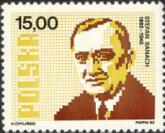
Stefan Banach
Poland

1982. Mathematicians
| SG2852 | 15 zloty | S Banach |
|
Banach was one of the all time greatest mathematicians of the last century, though he did not have any university degree in mathematics. Born in Krakow in 1892, Banach attended both primary and secondary schools there. During his young ages, he was believed to be a gifted student in mathematics, however, he chose to do engineering at university as he thought there would be nothing more in mathematics for him to study. Banach's life could have followed another way if an event had not occurred in 1916. Steinhaus, a mathematician at Jan Kazimierz University, told Banach about a problem, which he had tried for a long time without success. Banach got the ideas after only a few days and they then went on publishing their first joint paper. From that point, Banach's works were produced at a remarkably rapid speed. In 1920, Banach lectured mathematics at Lvov Technical University, where he had done his university degree in engineering. In the same year, he was promoted to doctor and became full professor four years later. Not only busy at writing many important papers, Banach and Steinhaus founded a new journal Studia Mathematica in 1929 and then later they edited the famous series Mathematical Monographs with Kuratowski, Mazurkiewicz, and Sierpinski. Just before the World War II, Banach became the President of the Polish Mathematical Society, a post that was first held by Zaremba in 1919. However, when the German came to Poland in 1941, Banach was in little trouble. His health got worst after that and Banach then died of lung cancer in 1945 in Lvov. During his life, Banach made a huge contribution to modern mathematics. He was the founder of functional analysis, the author of a lot of classic papers in topological vector spaces, integration, measure theory and set theory. Banach space, Hahn-Banach theorem, Banach-Steinhaus theorem, Banach-Alaoglu theorem, Banach fixed point theorem and Banach-Tarski paradox are only some of many important theorems named after him.
|
| Mathematics Home |
|
|
|
|
@ Hung